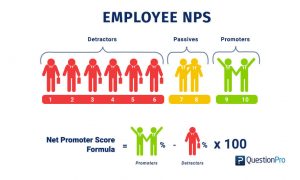
I just became aware of a tool used by many S&P 500 companies called NPS or Net Promoter Score. The basic idea is to find out how many of your customers are so-called Promoters. The thought being if your customers give a product a 9 or 10 rating on a ten-point scale, they are promoters. Those who give it a 7 or 8 are passives and those who give it a 0 through 6 are detractors. That is what I want to examine today, the idea of promoters, passives, and detractors.
The idea was created by a fellow named Fred Reichheld although he doesn’t approve of the way it is currently being used by management in many companies. There is a lot to said for the NPS system both for and against but that’s not going to be the gist of my blog today. I want to look at NPS from a different angle.
I used to work as an instructor and we often gave out those one to ten rating scales for students to evaluate their experience in the class. I’ve also filled out many of them for various products that I’ve purchased over the years. I’ve come to a completely different conclusion than Reichheld although the practical implications may be about the same.
The idea of promoters is, of itself quite interesting. There is an underrated movie called The Joneses which examines this idea in fairly great detail. I wrote a Libertarian review of the movie not long ago should you wish to read it. In any case, the idea is that promoters go out and tell other people how great is your product and influence them into purchasing it.
The NPS system lumps people who give a product a 9 or 10 rating as promoters. My experience is fairly different. People who habitually rate a product that high are almost always True Believers who either lack critical thinking skills or simply choose not to apply them. People who rate a good product as 7 or 8 generally are more inclined to be skeptical. My own thinking is that I would almost never rate anything a perfect ten as nothing is without flaws.
The bottom end of the scale is where I radically differ from ideology of the NPS. I think people who give a product a 0 through 2 rating are generally exactly the same as those who give it a 9 or 10. They are True Haters. They don’t like either the product or its manufacturer for some personal reason and no amount quality is going to change their mind. They are, in essence, exactly the same as the people who rate the product highly. It is my opinion it is these people who should be targeted by the manufacturer for they, if swayed through some small act of kindness, will become True Believers for life.
I would be interested in a study of NPS scores compared to religious and political beliefs to see if there is a correlation between individuals who give extreme scores and those who espouse extreme political ideas.
In summation, I actually agree with some of the principles of the NPS. The system might call them Promoters while I use the term True Believers. The system calls middle scorer givers Passives whereas I call them Skeptics. The end result is; however, valid. The True Believers will promote and purchase the product no matter the quality, whereas the Skeptics will purchase products from competitors if they are objectively better. It is only with the low scorers where my disagreement with the NPS conflicts with the actions of business leaders.
What do you think?
Tom Liberman